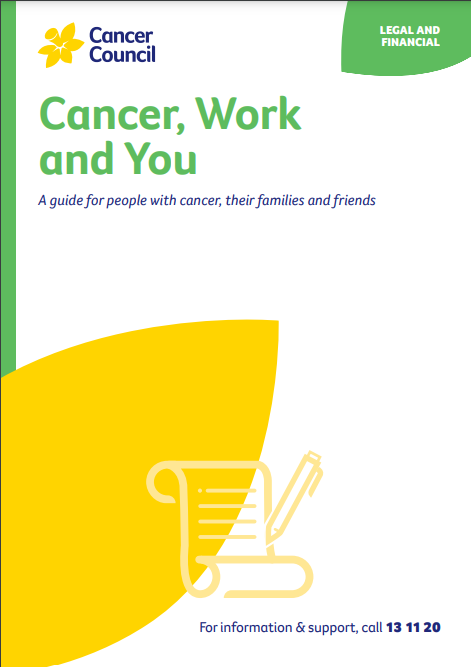- Home
- Cancer Information
- Practical concerns
- Cancer, work and you
- For workers
- Key questions about cancer and work
- How can my employer support me?
How can my employer support me?
Under Australian law, cancer is considered a disability. If you cannot perform your usual work duties, federal and state/territory disability and non-discrimination laws require your employer to make changes to the workplace so you can keep working. These changes are known as reasonable adjustments.
An employer must allow you to work flexibly (within reasonable guidelines) and approve the changes within 21 days of any request. The only reason an employer can refuse your request is if it would cause unjustifiable hardship to their business or, in some cases, on reasonable business grounds. They may be able to refuse changes if you cannot perform the essential parts of your role. Learn more about your workplace rights.
Changes could be to your duties, workspace or hours. Changes could be temporary or long term. You and your employer can discuss ideas for possible changes. Your health care team may also have useful suggestions.
Reasonable adjustments include:
- extra breaks because of pain, fatigue, or to attend appointments
- temporary duties as agreed, reduced hours, flexitime, working from home, part-time work or a gradual return to work
- changes to the workspace such as a more suitable chair, height-adjustable desk or counter, or ergonomic work tools
- providing new technology, such as voice-activated software, telephone headsets, a hearing loop or screen-reading software
- setting you up to use the National Relay Service on your computer, tablet, mobile phone or telephone typewriter (TTY). This service helps people who have a hearing or speech impairment to make phone calls. For more information, call 1800 555 727.
Your employer can get advice, financial support and practical assistance to help support you through JobAccess, an Australian Government service. Call 1800 464 800. Many employers have employee support systems, rehabilitation and retraining programs, or an Employee Assistance Program (EAP) that offers free, confidential counselling, including career counselling. Another option may be a buddy or mentoring system with someone in your workplace who has had cancer. Your co-workers may offer advice or help you liaise with management.
→ READ MORE: Should I tell my co-workers?
Podcast for people affected by cancer
Listen now
More resources
Brooke Russell, Principal Occupational Therapist, WA Cancer Occupational Therapy, WA; Bianca Alessi, 13 11 20 Consultant, Cancer Council SA; Dr Prunella Blinman, Medical Oncologist, Concord Cancer Centre, Concord Repatriation General Hospital, NSW; James Chirgwin, Physiotherapist, The Wesley Hospital, QLD; Danielle Curnoe, Consumer; Simon Gates, Barrister, Tasmanian Bar, TAS; Justin Hargreaves, Medical Oncology Nurse Practitioner, Bendigo Health Cancer Centre, VIC; Kaylene Jacques, Director, People and Communications, Cancer Council NSW; Alex Kelly, Senior People Attraction Advisor, Human Resources, Allianz Australia Insurance, NSW; Legal reviewer; Georgina Lohse, Social Worker, GV Health, VIC; Lesley McQuire, Consumer, Cancer Voices NSW.
View the Cancer Council NSW editorial policy.
View all publications or call 13 11 20 for free printed copies.
Need to talk?
Support services
Coping with cancer?
Speak to a health professional or to someone who has been there, or find a support group or forum
Need legal and financial assistance?
Pro bono services, financial and legal assistance, and no interest loans
Cancer information
Dealing with the diagnosis
Common reactions to a cancer diagnosis and how to find hope
Resource hub
Guides, fact sheets, videos, podcasts and more for people with cancer, their families and friends

